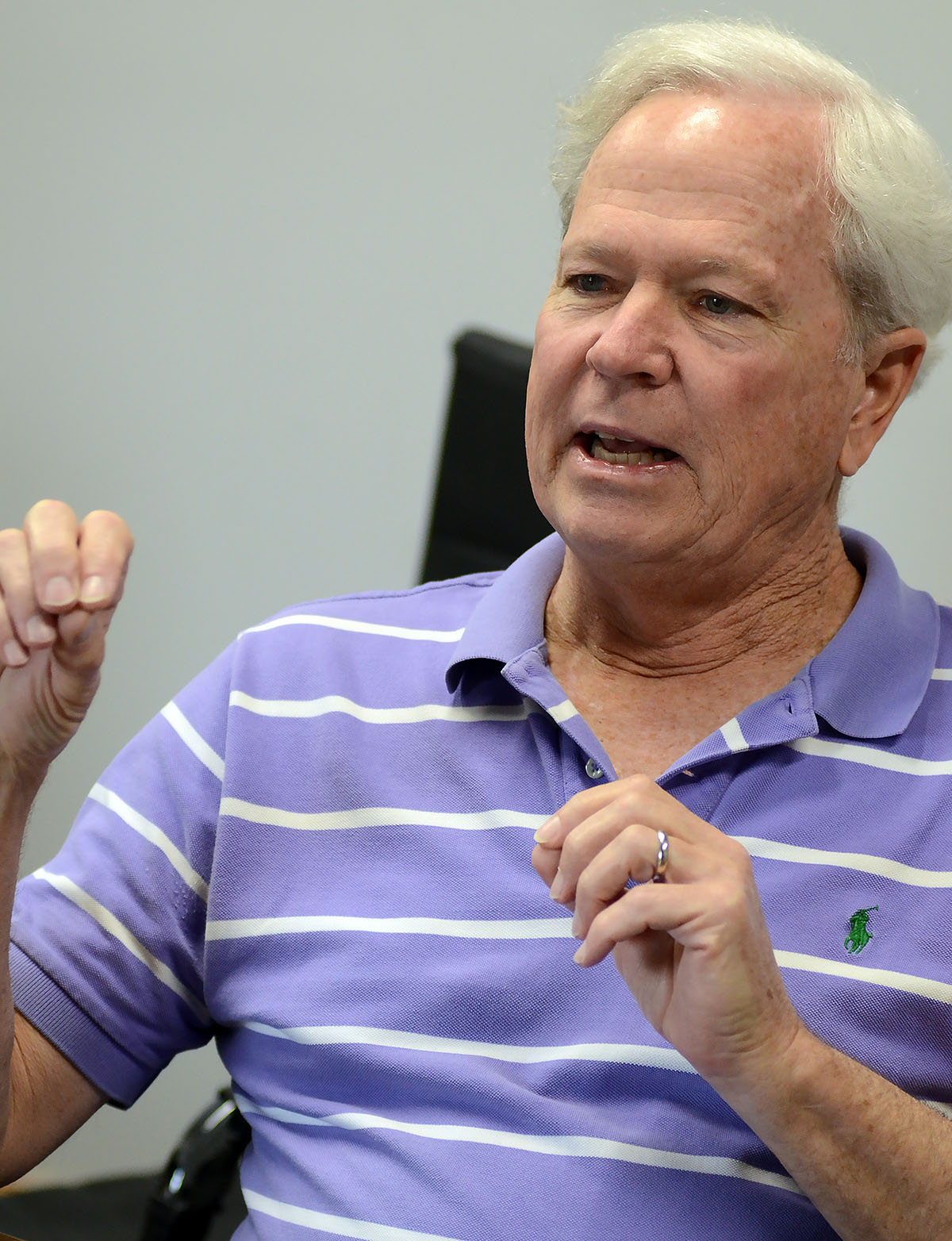Mississippi Today
Jackson community leaders call out Henifin for lack of collaboration, personnel issues

Jackson community leaders call out Henifin for lack of collaboration, personnel issues
A group of Jackson community leaders on Wednesday panned the federally appointed manager of the city's water system over a number of issues, including a lack of collaboration and transparency, the firing of an employee and awarding a large contract to an out-of-town business.
The Mississippi Rapid Response Coalition, which has led water distribution efforts and rallies during the peaks of the Jackson water crisis, spoke to the media on Wednesday after meeting with officials from the Environmental Protection Agency and the Department of Justice. In November, those two agencies agreed to a federal order with the city of Jackson that put a third-party manager, Ted Henifin, in control of rehabbing the drinking water system.
The EPA and DOJ are in Jackson this week meeting with residents, and asking both in person and through an online survey for input on the future of the water system. (Jacksonians interested in participating can access the survey at this link).
At the Wednesday meeting, the coalition asked the two federal agencies for more inclusion in the future decision-making process around the water system moving forward. As the coalition said to reporters after the meeting, there hasn't been enough collaboration between Henifin and community members thus far.
“There has been no collaboration as it relates to the overall process,” Danyelle Holmes, a member of the coalition and National Social Justice Organizer with the Poor People's Campaign, said, adding that residents haven't been getting boil water notices during outages. “There's no transparency, or accountability at all. We have not had meetings with (Henifin)… the collaboration has fallen short with the coalition.”
Under the federal order that put Henifin in charge, there's little oversight over the manager's role other than that of the U.S. judge who appointed him. As a non-public entity, Henifin's organization, JXN Water, is not subject to public records laws, and it also can avoid state and local statutes around procuring contracts with public dollars. The order also allows Henifin to make changes, such as to the water billing system, without the approval of elected Jackson officials.
Henifin has repeatedly stated his commitment to being transparent, and said he wants the approval of Jacksonians before he makes changes to the billing system or recommends a new structure for future governance. In an interview with Mississippi Today, he talked about earning the trust of residents, and how he hopes that will start to take shape once they see improvements.
Henifin, who has appeared at several town hall events since his appointment, said his next step in making long-term changes to the water system is holding community engagement sessions, although JXN Water has not put out details for when those will be.
Coalition members said they were disappointed in how the federal takeover has played out so far in terms of working with the community. They were also frustrated with specific decisions Henifin has made so far, such as awarding a large operations and maintenance contract to Texas-based Jacobs Solutions.
Henifin announced last month the six-month contract, which will pay Jacobs $2 million a month to run the city's water treatment plants and train local operators for long-term staffing.
“We have great pause when we bring in firms like Jacobs and pay them $2 million a month and we don't pay our local firms anything in sight of that,” said Socrates Garrett, a Jackson businessman whose firm contracts engineering services. “We think that you could've had hired a minority firm as the primary contractor and let Jacobs be the (sub-contractor).”
Henifin told Mississippi Today that he expects to extend Jacobs' contract between five to 10 years, adding that he also expects the extension to come at a cheaper monthly rate.
Holmes also alleged that Henifin “wrongfully” fired the one Black employee of JXN Water, Chief Experience Officer Tariq Abdul-Tawwab, last week. Abdul-Tawwab was brought on to improve the customer service experience for Jackson water customers, who for years have experienced unreliable billing and long wait times to reach anyone at the city's water department.
While the nonprofit recently removed Abdul-Tawwab from its website, Henifin said in a statement yesterday that “it is not our policy” to comment on personnel decisions. Neither Henifin nor JXN Water responded to requests for comment in response to the coalition's other criticisms.
Both Holmes and Garrett talked about the importance of JXN Water and its contractors reflecting the 83% Black capital city.
Claims about Abdul-Tawwab's position with JXN Water comes just after a debt relief program he was helping to publicize made local news over questions of how the program was being funded.
Last week, after the city announced new federal funding that would relieve residents' water bill debts, WLBT reported that Jackson hadn't actually received all the federal funds that JXN Water thought it would to fund program. The city then, using another program, had to write off most of the debt it was relieving residents of, rather than paying the debt off, the story reported.
Despite Henifin later clarifying the confusion in a public statement, Mayor Chokwe Antar Lumumba on Monday said he believed Henifin made a mistake in communicating details of the program, adding that it was done in good faith.
In the WLBT story, Henifin said he thought some of the confusion around funding amounts came from “his staff.” Abdul-Tawwab spoke at multiple public events to brief residents about the debt relief program. Other than those two, JXN Water has only had one other employee, Chief Operating Officer Jordan Hillman, according to its website.
In his statement Wednesday, Henifin added:
“We'll continue our work improving the customer service experience and hope to maintain a relationship with the community organizations that helped introduce us to the Jackson community. We're hopeful that all the community partners stay at the table and continue to hold us accountable to the people of Jackson.”
At its meeting with federal officials Wednesday, the coalition also presented a petition, which it says has over 6,000 signatures, asking the EPA to protect Jackson from a privatized water system, as well to provide water filters to ensure clean water for residents.
Questions over the future management of the water system emerged this legislative session when lawmakers tried, and failed, to create a state-controlled regional authority to oversee the system. Henifin, who opposed the bill, favors putting the system's control under a nonprofit led by a board of constituents.
This article first appeared on Mississippi Today and is republished here under a Creative Commons license.
Mississippi Today
On this day in 1951


April 28, 1951

Ruby Hurley opened the first permanent office of the NAACP in the South.
Her introduction to civil rights activism began when she helped organize Marian Anderson's 1939 concert at the Lincoln Memorial. Four years later, she became national youth secretary for the NAACP. In 1951, she opened the organization's office in Birmingham to grow memberships in Alabama, Florida, Georgia, Mississippi and Tennessee.
When she arrived in Mississippi, there were only 800 NAACP members. After the governor made remarks she disagreed with, she wrote a letter to the editor that was published in a Mississippi newspaper. After that step in courage, membership grew to 4,000.
“They were surprised and glad to find someone to challenge the governor,” she told the Chicago Defender. “No Negro had ever challenged the governor before.”
She helped Medgar Evers investigate the 1955 murder of Emmett Till and other violence against Black Americans. Despite threats, she pushed on.
“When you're in the middle of these situations, there's no room for fear,” she said. “If you have fear in your heart or mind, you can't do a good job.”
After an all-white jury acquitted Till's killers, she appeared on the front cover of Jet magazine with the headline, “Most Militant Negro Woman in the South.”
Months later, she helped Autherine Lucy become the first Black student at the University of Alabama.
For her work, she received many threats, including a bombing attempt on her home. She opened an NAACP office in Atlanta, where she served as a mentor for civil rights leader Vernon Jordan, with whom she worked extensively and who went on to serve as an adviser to President Bill Clinton.
After learning of Evers' assassination in 1963, she became overwhelmed with sorrow. “I cried for three hours,” she said. “I shall always remember that pool of blood in which he lay and that spattered blood over the car where he tried to drag himself into the house.”
She died two years after retiring from the NAACP in 1978, and the U.S. Post Office recognized her work in the Civil Rights Pioneers stamp series. In 2022, she was portrayed in the ABC miniseries, “Women of the Movement.”
This article first appeared on Mississippi Today and is republished here under a Creative Commons license.
Mississippi Today
Rare open negotiations occur on important Medicaid expansion issue
The curtain was pulled back last week for the first time in years on the Mississippi Legislature's often mysterious conferencing process.
A conference committee consists of three representatives and three senators appointed to try to reach agreement when the two chambers pass differing versions of the same bill. Last week, a conference committee formed to try to reach agreement on Medicaid expansion caused a stir by meeting in a public setting.
Even though the joint rules of the Mississippi Legislature call for an open conferencing process, the conferees seldom meet in public. They usually meet and negotiate their differences near the end of the session behind closed doors.
That was not always the case.
For a period in the late 1990s and early 2000s, the Legislature, under intense pressure from the Mississippi Press Association, made open conference committees the norm.
Some major issues have been played out in public conference committees. Notable open conferences include:
- The infamous, excruciatingly long special session in 2002 where businesses received more protection from lawsuits.
- Budget fights when Haley Barbour was governor when legislators often would reach an impasse in the negotiations process and spend the bulk of their time talking about their cars and eating candy.
- The major rewrite of the state's economic development package under then-Gov. Ronnie Musgrove called Advantage Mississippi.
- The Mississippi Adequate Education Program, which for decades has provided the state's share for the basic operation of local school districts. It was hammered out in an open conference process in 1997 even before the joint rules mandated the open process.
Then-state Sen. Musgrove and former House Speaker Billy McCoy deserve credit or blame, according to one's perspective, for proving the open conference process could work. When they chaired their respective chamber's education committees, they insisted on having an open conference process.
But in more recent years, open conference committees have been few and far between. The joint rule has been largely ignored.
The fact that the three House and three Senate conferees agreed to meet at least once in public on Medicaid expansion — one of the most pivotal issues facing the Legislature in recent years — drew considerable attention.
If nothing else, the open conference committee provided a raw and unedited view of how far apart the two chambers were at the time on an issue that would provide additional health care coverage to primarily the working poor.
The House wanted to provide coverage to those earning up to 138% of the federal poverty level, or about $20,000 annually for an individual, while the Senate had proposed providing coverage to those earning less than 100% of the federal poverty level, or about $15,000 per year.
According to various experts, the House plan would provide coverage to many more working Mississippians and cost less to the state than would the Senate plan. The reason for the lower cost to the state is that when expanding to 138%, the federal government will pay 90% of the costs and provide the state an additional roughly $700 million over two years as an enticement to expand.
Under the Senate plan, the federal government will pay 77% of the cost and offer no incentives. It is important to understand that in the expensive world of health care, the difference in 77% of the cost and 90% means tens of millions to Mississippi state coffers.
The House conferees repeatedly pointed out those numbers — their plan covering more at less cost — during last week's open conference committee.
One of the reasons legislators through the years have not been enamored with an open conference process is that it has often turned into efforts by the negotiators to sell their position to the public.
Once the open conference process starts, the side that feels the most comfortable with its position wants to meet more often in full view of the public to make sure the public understands where each side stands.
For whatever it is worth, the House conferees were more enthusiastic about continuing the open process after the initial Medicaid expansion conference committee.
And after that initial open conference, the Senate offered a compromise to cover those earning up to 138% of the federal poverty level — just as the House proposed.
This article first appeared on Mississippi Today and is republished here under a Creative Commons license.
Mississippi Today
Legislation to strip key power of PERS Board passes both chambers
Legislation that strips significant power from the board that governs the state's public employee pension program has passed both chambers of the Legislature.
Under the legislation set to go to Gov. Tate Reeves during the final days of the 2024 session, the Public Employees Retirement System Board would no longer have the authority to increase the contribution rate levied on governments (both on the state and local level) to help pay for the massive retirement system.
The legislation, which passed both chambers in recent days, was a reaction to the decision by the board to increase by 5% over a three-year period the amount local governments contribute to each employee's paycheck for their retirement. Under the PERS Board plan, the employer contribution rate would have been increased to 22.4% over three years, starting with a 2% increase on July 1.
The board said the increase was needed to ensure the long-term financial stability of the system that pays retirement benefits for most public employees on the state and local levels, including staff of local school districts and universities and community colleges.
City and county government officials in particular argued that the 5% increase would force them to cut government services and lay off employees.
Under the bill passed by the Legislature there still would be a 2.5% increase over five years — a .5% increase in the employer contribution rate each year for five years.
In addition, legislative leaders said they plan to put another $100 million or more in state tax dollars into the retirement system in the coming days during the appropriations process.
Under current law, the PERS Board can act unilaterally to increase the amount of money governmental entities must contribute to the system. But under the new bill that passed both chambers, the board can only make a recommendation to the Legislature on increasing the employer contribution rate.
The PERS Board also would be required to include an analysis by its actuary and independent actuaries on the reason the increase was needed and the impact the increase would have on governmental entities.
In the 52-member Senate, 14 Democrats voted against the bill. Only one House member voted against the proposal.
Sen. David Blount, D-Jackson, said the bill failed to address the financial issues facing the system. He said a permanent funding stream is needed.
Blount said, “You are moving in the wrong direction and weakening the system” with the bill the Legislature approved. “Is it painful? Is it going to cost more money? Yes, but we need to do it” to fix the system.
The system has assets of about $32 billion, but debt of about $25 billion. But Sen. Daniel Sparks, R-Belmont, and others argued that the debt was “a snapshot” that could be reduced by strong performance from the stock market. The system depends on its investments and contributions from employers and employees as sources of revenue.
The system has about 360,000 members including current public employees and former employees and retirees.
The legislation states that no changes would be made for current members of the system. The legislation does reference looking at possibly changing the system for new employees. But that would be debated in future legislative sessions.
The bill does not include an earlier House proposal to dissolve the PERS Board, which consists primarily of people elected by the members of the system, and replace them with political appointees.
This article first appeared on Mississippi Today and is republished here under a Creative Commons license.
-
Local News4 days ago
Sister of Mississippi man who died after police pulled him from car rejects lawsuit settlement
-
Mississippi Today4 days ago
At Lake High School in Scott County, the Un-Team will never be forgotten
-
Mississippi News2 days ago
One injured in Mississippi officer-involved shooting after chase
-
Mississippi Today14 hours ago
On this day in 1951
-
Mississippi News6 days ago
Cicadas expected to takeover north Mississippi counties soon
-
Mississippi News5 days ago
Viewers make allegations against Hatley teacher, school district releases statement – Home – WCBI TV
-
Mississippi News Video4 days ago
Vehicle struck and killed man lying in the road, Alcorn County sheriff says
-
Mississippi Today7 days ago
On this day in 1892






































